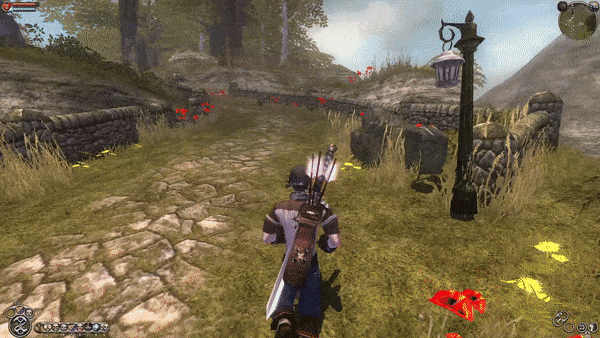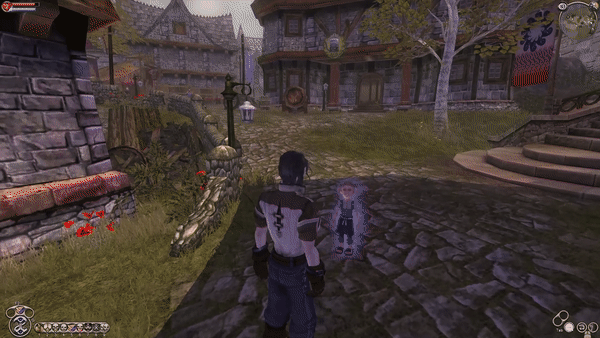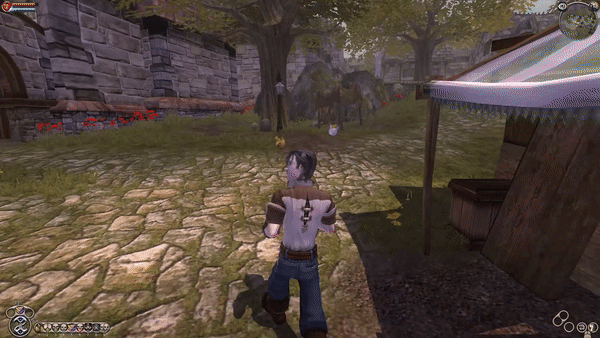I love CRPGs. I don’t know that they’re my favourite genre, but I have sunk an ungodly number of hours into them. Disappearing into a Bioware or Obsidian game is like losing yourself in a massive, complex novel. It’s a big, complex genre.
Fable is not like those games. The plot is incredibly simple, the roleplaying is virtually non-existent, and the systems are very rudimentary. But despite all this I just. Keep. Coming. Back. To. It.
Why!? What is it about this game that drags me back again and again? Because, by rights I should dislike it. It’s an RPG that does away with so many of the elements that I want out of an RPG. There’s no branching dialogue. No companions. No real character creation beyond the ability to get a haircut and some tattoos. And the game has what can only be describe as a mixed reputation, one what was unquestionably damaged by designer Peter Molyneux overselling what it would be. Describing the game in the lead up to its release, Molyneux notoriously ran his mouth, and made claims such as players would be able to plant acorns and watch as they grew into oaks over the course of the game. The game Molyneux tried to sell sounded like Ultima VII meets Dwarf Fortress on steroids, and was entirely undeliverable.
So, instead of a vast, dynamic world of infinitely branching possibilities, we got an action game with the occasional binary moral choice to make. Will you play as a total goody two-shoes, or a psychopathic bastard? Morality systems were all the rage in 2004, and were a box-point feature on many games, a way of pitching your game as reactive to your choices in a way that games from ten years prior would have struggled with. But the mechanic was still in its “novelty” phase. Being good or evil would change your character’s appearance, a feature from Bioware’s Knights of the Old Republic that became commonplace. In Fable noble heroes would eventually develop a halo, while villains would sprout horns. You moral choices were simple binaries: usually boiling down to “do you help this person or murder them and cackle maniacally over their corpse?”. It wasn’t until Mass Effect released in 2007 that the idea of moral choices oscillating between being good versus being ruthless pushed out the kind of melodramatic, Victorian villainy that Fable tempts you with.
Tonally, the game is sort of a Discworld-lite. It’s full of regional English accents, and “kooky” behaviour, and characters being matter-of-fact about all the silliness you’re presented with, but it doesn’t nearly have the darkness or depth of Terry Pratchett’s writing to carry all of this. At times it tries to capture some of the comically overblown evilness from Molyneux’s Dungeon Keeper, a tone that, it it turns out, is quite hard to hit. Nothing in Fable makes me laugh out loud in the way that Dungeon Keeper’s narrator’s obvious disgust with anything nice or happy does.
This has been a long list of complaints about Fable with little to justify why I’ve played it so much. The answer to that, unfortunately, remains that I don’t know. There’s something there, but I can’t put my finger on it. Maybe it’s the little ways the world sells itself as being alive, the cycle of shops opening and closing, the people scurrying around towns doing their jobs before retiring to the local pub in the evening for a drink. It had been done before, but there genuinely is something about the way it’s presented here that makes it feel more readable than its implementation in earlier games like Ultima VII or Gothic 2.
Perhaps also it’s the combat system? It’s pleasantly meaty and intuitive, rather than being a glut of numbers and statistics like so many RPGs. Releasing at a similar time to Jade Empire, unquestionably a better RPG in just about every other way, Fable demonstrates how weightless that game’s combat feels in comparison. Cult favourite Kingdoms of Amalur seems to draw heavily on Fable’s approach, so there’s an argument to be made that this is the thing that makes the game work and gives it some fundamental appeal.
And maybe the simple take on morality is actually a virtue? The game is, after all, what its title proclaims it to be: a fable. It’s a relatively uncomplicated morality tale about good and evil, not shades of grey. The game doesn’t demand that you navigate a complex moral landscape; doesn’t suggest that it’s in any way difficult to identify who is a villain and who is a hero; absolutely does not imply that doing the right thing might ever have to involve moral compromise. These things are all staples of the RPGs that are generally regarded as the “greats” of the genre, and perhaps what Fable offers is a respite from that style of storytelling. A chance to recharge.






I find it funny that "Fable Hype" is just this thing that has to live with gaming forever. If I had to choose for my game to have any kind of legacy, "it didn't live up to its marketing, and is forever associated with overblown promises" is probably not one of them.
I *did* completely clear Fable 2, though; I made the mistake of trying to savescum the last choice to get achievements, messed it up (sacrificed my dog first) and then had to do the walk of shame to get the others.